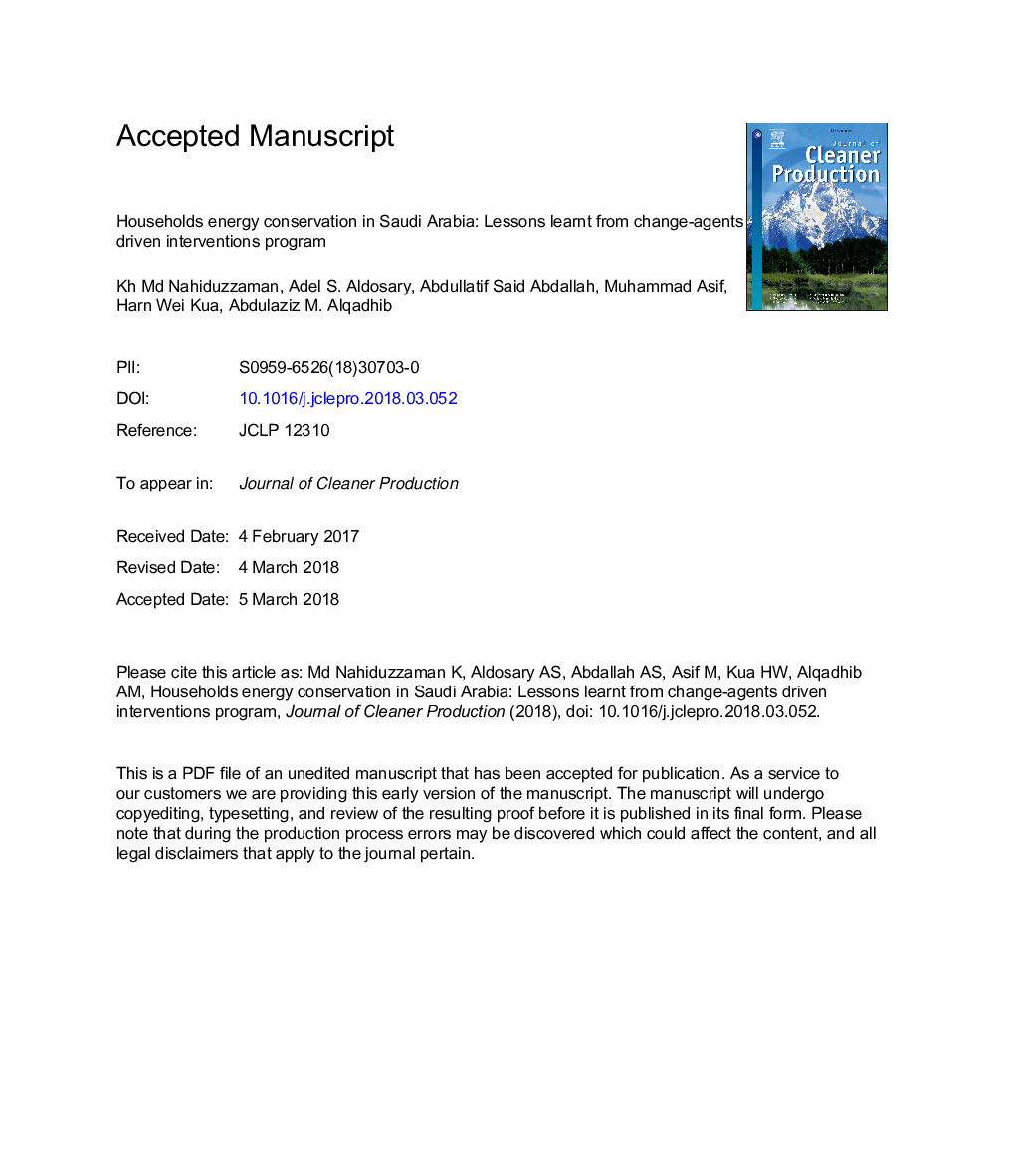| کد مقاله | کد نشریه | سال انتشار | مقاله انگلیسی | نسخه تمام متن |
|---|---|---|---|---|
| 8096600 | 1522068 | 2018 | 33 صفحه PDF | دانلود رایگان |
عنوان انگلیسی مقاله ISI
Households energy conservation in Saudi Arabia: Lessons learnt from change-agents driven interventions program
ترجمه فارسی عنوان
صرفه جویی در انرژی خانوارها در عربستان سعودی: درس هایی که از برنامه های مداخله ای توسط عوامل تغییر یافته به دست آمده است
دانلود مقاله + سفارش ترجمه
دانلود مقاله ISI انگلیسی
رایگان برای ایرانیان
کلمات کلیدی
حفاظت انرژی، تغییر رفتاری، اثرات طول عمر، تمرین حفاظت،
ترجمه چکیده
عربستان سعودی از لحاظ مصرف سرانه یکی از پر انرژی ترین کشورهای جهان است. انرژی های بسیار یارانه ای و تعرفه های پایین انرژی مصرف داخلی را افزایش می دهد. تقاضای انرژی به سرعت در حال افزایش است و باعث شد تا کشور اقدامات متعددی را برای صرفه جویی در انرژی انجام دهد. با این حال، این ابتکارات همه فن آوری است و هیچ اقدام مشخصی برای تغییر رفتار کاربران نهایی انجام نشده است. به منظور کاهش میزان مصرف انرژی مسکونی، علاوه بر مقررات مناسب، بسیار مهم است که از طریق آموزش و آگاهی بهتر، کاربران نهایی را جذب کند. بنابراین، این مطالعه با هدف بررسی تاثیر مداخلات مبتنی بر رفتار، مداخلات غیرنظامی در درک نهایی مصرف کنندگان در زمینه صرفه جویی در مصرف انرژی و در نتیجه کاهش شدید مصرف انرژی خانوار است. با توجه به شهر جغرافیایی به عنوان تمرکز جغرافیایی، 88 خانوار شرکت کننده به طور تصادفی برای مداخلات انتخاب شدند. خانوارها به دو گروه درمانی و یک گروه کنترل تقسیم شدند. تجزیه و تحلیل مداخله شش ماهه نشان دهنده تأثیر مثبت، اما آماری ناچیز بر روی صرفه جویی در انرژی بود. نتایج نشان می دهد که بین تعداد بزرگسالان در خانواده و میزان تحصیلات با مصرف انرژی رابطه مثبت وجود دارد، در حالیکه تعداد اعضای زن در خانواده، اندازه خانواده، منطقه ساختمان نشان دهنده یک رابطه منفی است که به "مقیاس مقیاس" مربوط می شود و وجود رفتار طرفدار محیط زیست. در نهایت، این مطالعه تلاش می کند تا زمینه پایه ای برای تجویز سیاست بر روی صرفه جویی در انرژی بر اساس روش های سرمایه گذاری و محدودیت برای تعیین اثرات طول عمر ایجاد کند.
موضوعات مرتبط
مهندسی و علوم پایه
مهندسی انرژی
انرژی های تجدید پذیر، توسعه پایدار و محیط زیست
چکیده انگلیسی
Saudi Arabia is one of the most energy intensive countries in the world in terms of per capita consumption. Highly subsidized energy prices and low tariffs are driving up domestic energy consumption. The rapidly growing energy demand has prompted the country to undertake several energy-saving measures. These initiatives, however, are all technology driven and no apparent measures have yet been taken to modify end users' behavior. In order to reduce the rate of growth of residential energy consumption, besides appropriate regulations, it is critical to engage end users through better education and awareness. Thus, this study aims to investigate the impact of behavior-based, non-technical interventions on end users' perceptions of energy conservation and, subsequently, any actual reduction in household energy consumption. Taking Khobar city as the geographical focus, 88 participating households were randomly chosen for interventions. The households were divided into two treatment and one control group. Analysis of the six-month intervention revealed a positive but statistically insignificant impact on energy conservation. The results suggest that there is a positive relation between the number of adults in the family and level of education with the energy consumption while number of female members in family, family size, building area shows a negative association attributing to 'economies of scale' and existence of pro-environmental behavior. In the end, this study attempts to build a foundational ground for policy prescription on energy conservation based on 'investment' and 'curtailment' behavior approaches to assess the 'longevity' effects.
ناشر
Database: Elsevier - ScienceDirect (ساینس دایرکت)
Journal: Journal of Cleaner Production - Volume 185, 1 June 2018, Pages 998-1014
Journal: Journal of Cleaner Production - Volume 185, 1 June 2018, Pages 998-1014
نویسندگان
Kh Md Nahiduzzaman, Adel S. Aldosary, Abdullatif Said Abdallah, Muhammad Asif, Harn Wei Kua, Abdulaziz M. Alqadhib,
